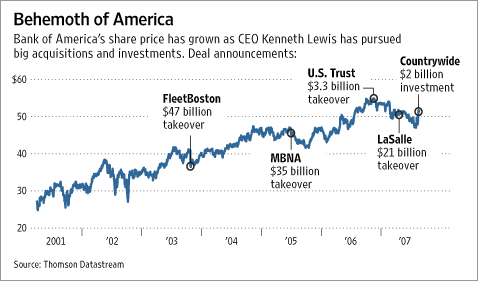 There is a fine line between brilliance and stupidity. In the world of finance and investing, that line can sometimes be measured by risk and reward. If the decision made by an investor turns out to be profitable, then we look at the outcome as a result of either luck or well-planned execution. The risk was simply the potential for a loss or gain. Of course this is OVERsimplified, but you get the point.
There is a fine line between brilliance and stupidity. In the world of finance and investing, that line can sometimes be measured by risk and reward. If the decision made by an investor turns out to be profitable, then we look at the outcome as a result of either luck or well-planned execution. The risk was simply the potential for a loss or gain. Of course this is OVERsimplified, but you get the point.
Bank of America (BAC) is walking that very line right now with the infusion of $2 billion into the troubled Countrywide Financial (CFC). The latest acquisition by the company is not the first one that CEO Ken Lewis has stuck his neck out on. In fact, he seems to be making a habit of cleaning up corporate messes.

The takeover of US Trust was the result of ongoing losses by Schwab (SCH). It became painfully obvious to shareholders after it became obvious after several quarters of miscommunication and the drag on corporate earnings. Originally the “Crown Glory” of then CEO, David Pottruck, it was seen as a departure from Schwab‘s core business as he looked to expand into high-net-worth clientèle segment. The inability of Pottruck to assimilate the US Trust division into Schwab‘s business ultimately lead to the decision to release both Pottruck and US Trust. Bank of America’s Lewis looked at this as a great opportunity to pick up US Trust at a bargain price. So far this seems to have been a great move by Lewis.
Now, according to The Wall Street Journal, Bank of America paid $2 billion for preferred shares of Countrywide that yields 7.25% dividends and are convertible into a 16% stake in the lender. This deal booked a nice profit (paper for now) of about $400 million.
What’s more, since Lewis was positioned as CEO, Bank of America’s annual revenue has more than doubled to more than $74 billion. Its assets have more than doubled to $1.46 trillion. And profits have more than tripled, to $21.1 billion last year.
The timing of the Countrywide deal is going to become Lewis‘s greatest triumph if Countrywide emerges from this crisis and eventually is able to clean up any significant outstanding financial issues. This is clearly a time that will benefit the “last man standing” in the beleaguered mortgage industry. The companies that are able to weather this storm will surely become the new leaders within the financial industry. As is said; what does not kill them, will surely make them stronger.
No matter how the Countrywide story unfolds, this was a brilliant move by Lewis to strengthen the industry by allowing for additional liquidity and at the some time helping to boost investor sentiment. Either way, Bank of America will surely be one of the last ones standing. The wild card will be if they do it with, or without, Countrywide by their side. Even though Countrywide CEO Mozilo currently denies any merger talks, he will surely warm up to the idea if the sub-prime mess worsens and his company continues to suffer.
Horowitz & Company clients have Long positions in the securities mentioned as of the date of this post.

















